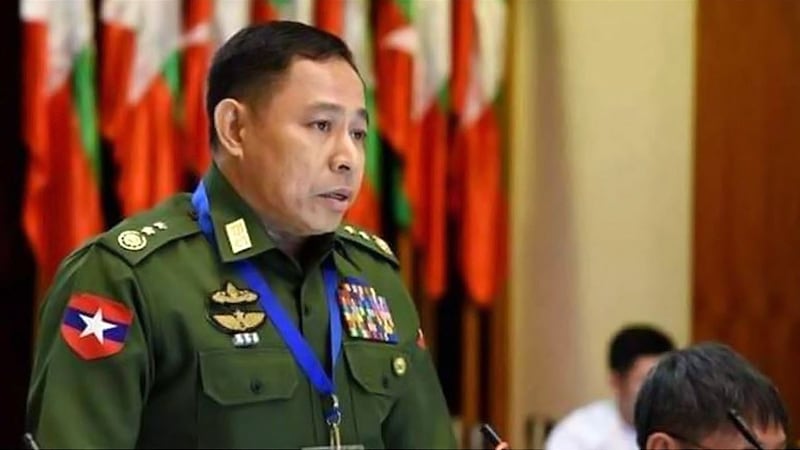A recent reshuffling of top military personnel by the leader of Myanmar’s junta is part of an effort to gain control of the entire governing apparatus and remain in power for years to come, analysts and observers said.
Among the top generals reassigned on Aug. 3 were the heads of the defense and home affairs ministries – the first changes since Senior Gen. Min Aung Hlaing seized power from the elected civilian-led government in a February 2021 coup. The two ministries are responsible for tackling armed anti-junta resistance fighters across the country.
Former Transport and Communications Minister Gen. Tin Aung San was appointed as defense minister, making him a member of the National Defense and Security Council, and former Defense Minister Gen. Mya Tun Oo was made transport and communications minister. Both will continue serving as deputy prime ministers.
Lt. Gen. Yar Pyae, the former Union Government Office 1 minister, replaced Lt. Gen. Soe Htut as head of the Home Affairs Ministry. Yar Pyae held on to his position on the State Administration Council – the junta’s governing body – and his roles of national security adviser to Min Aung Hlaing and leader of the junta’s peace negotiation team.
The move came days after Min Aung Hlaing extended emergency rule in Myanmar for another six months on July 31, thereby delaying the date by which elections must be held according to the country’s constitution. The junta previously pledged to hold elections in August.
It also occurred as Myanmar, already hit hard by economic sanctions, faces intense international criticism over the military’s attacks on civilian communities and execution of detained combatants in areas that are hotbeds of resistance to the regime.
An annual report released publicly on Tuesday by the U.N.'s Independent Investigative Mechanism for Myanmar cited strong evidence that the military and its affiliate militias have committed "increasingly frequent and brazen war crimes."
New assignments at lower levels
A leader of the nonviolent anti-junta civil disobedience movement, or CDM, said Min Aung Hlaing reassigned generals he trusts to important ministries to prepare for what he may face during the next state of emergency period.
“The Defense Ministry is just like a correspondence office under the commander-in-chief,” the person said. “That’s why he transferred Gen. Mya Tun Oo, who is one of his major players, to the Ministry of Transport and Communications, which he will heavily use in the future to tackle the issues of airplanes and cyber communication.”
Min Aung Hlaing appointed capable Yar Pyae as home affairs minister in place of Soe Htut, who is in poor health, to strengthen the operations of the State Administration Council over the next six months, he added.
The CDM leader, who served in the military for 21 years and held the rank of a captain, moved to the civilian administration where he worked for nearly a decade until he was promoted to a director position. Following the 2021 coup, he left his job and joined other professionals who walked off the job to peacefully protest against the regime.

Reassignments have also taken place among lower-ranking military officers.
From January to the end of June, the junta transferred 40 lieutenant colonels, majors and captains to civil ministries to work as chief executive officers, or deputy and assistant directors, according to the junta’s weekly national reports.
Among them were one lieutenant colonel, nine majors and 30 captains sent to work at the Myanmar Economic Bank, Election Commission, Union Civil Service Board, ministries of construction, industry and commerce, sports and youth affairs, hotels and tourism, and the Yangon and Naypyidaw City Development Committees.
The largest number of military officers were transferred to the Myanmar Economic Bank with five majors as managers and 16 captains as assistant managers.
The transfers indicate that the junta is trying to control the operation of civil departments as well, said former Captain Kaung Thu Win, a member of the CDM.
“The junta aims to replace its people in senior positions in the civil departments such as directors to be able to control the head of the departments so that they will follow its instructions more faithfully,” he told RFA. “It transferred junior officers to the civil departments so that they can provide the military with the necessary information inside each department.”
RFA could not reach junta spokesman Major Gen. Zaw Min Tun for comment on the personnel changes.
‘It’s called militarization’
Thein Tun Oo, executive director of the pro-military Thayninga Institute of Strategic Studies, said the new appointments would strengthen the military administration.
“The bureaucratic mechanism makes the administration of a country run smoothly and easily,” he said. “In order for that mechanism including national security projects to operate, it is important for all the people involved to be able to work effectively. That’s why we need really capable people who can focus on their tasks.”
More reliable replacements were made because many of the current government departments have experienced security breaches, he added.
The appointment of military officers to both top and middle-level civilian positions is the junta’s attempt to dominate the entire government apparatus, political and military analyst Than Soe Naing said.
“It’s called militarization,” he said. “It is a military’s attempt to dominate and control all departments.”
Given the country’s current situation with anti-junta People’s Defense Forces, led by the shadow National Unity Government, and ethnic armed groups fighting junta forces, it is important for the military regime to have reliable people to back it, Than Soe Naing said.
“They only work with their service members who they can trust, so that they feel safer,” he said.
Translated by Myo Min Aung for RFA Burmese. Edited by Roseanne Gerin and Matt Reed.

